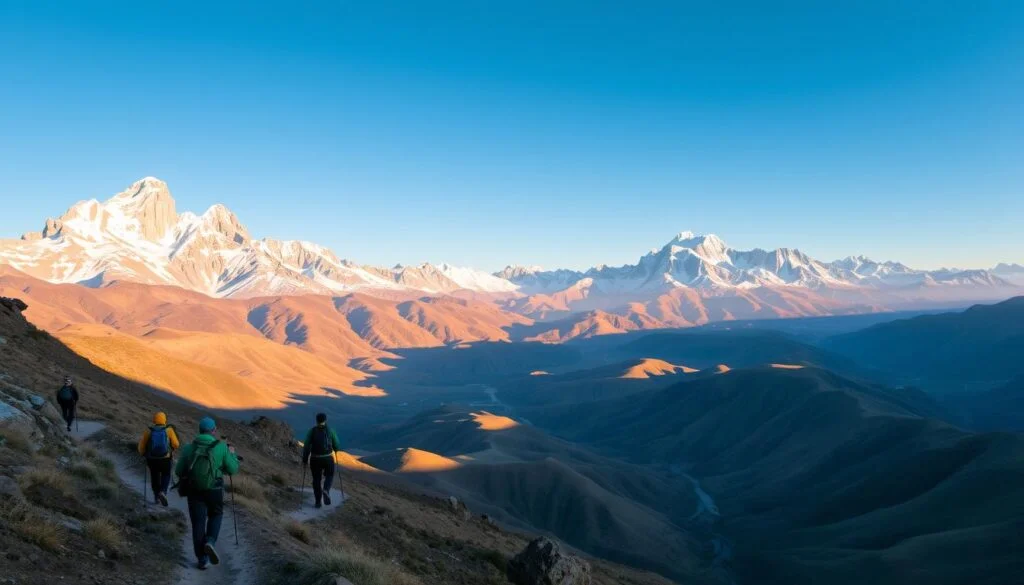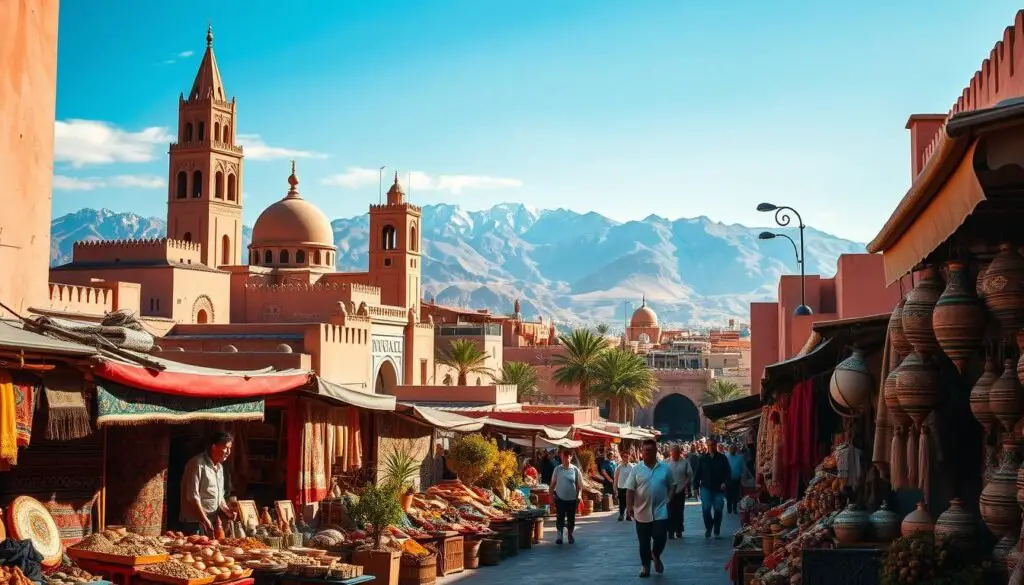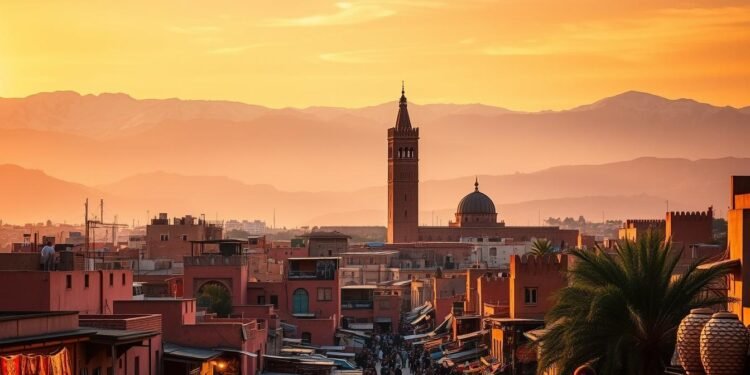What if the perfect time to visit Morocco isn’t just one season but a carefully chosen moment tailored to your travel goals? This North African gem offers a diverse range of experiences, from the bustling souks of Marrakech to the serene dunes of the Sahara. But with such varied climates and cultural events, planning your trip can feel overwhelming.
Morocco’s regions each have their own unique weather patterns. Coastal cities like Casablanca enjoy mild winters, while the desert can reach scorching highs in summer. The Atlas Mountains remain accessible year-round, but trekking conditions vary by season. Cultural events like Ramadan and Yennayer add another layer of complexity, offering immersive experiences but requiring careful planning.
This guide breaks down the country’s seasonal highlights, helping you align your travel goals with the right time. Whether you’re drawn to vibrant festivals, comfortable weather, or fewer crowds, we’ve got you covered. Let’s explore the best month to travel to Morocco for your ideal adventure.
Key Takeaways
- Morocco’s climate varies by region, from mild coastal areas to extreme desert temperatures.
- Align your travel goals with seasonal patterns for the best experience.
- Cultural events like Ramadan and Yennayer offer unique opportunities but require planning.
- The Atlas Mountains are accessible year-round, with seasonal considerations for trekking.
- This guide helps balance comfort, costs, and experiences for your trip.
Why Timing Matters for Your Morocco Trip
Understanding Morocco’s diverse landscapes and climates is key to planning a memorable trip. The country’s geographic diversity creates microclimates, meaning weather can vary drastically between regions. Coastal cities like Essaouira enjoy mild summers, averaging 70°F, while the Sahara Desert can soar to 109°F in July.
Festivals also play a significant role in shaping your experience. During Ramadan, daytime closures are common, but nights come alive with vibrant energy. Planning around these events ensures you don’t miss out on unique cultural moments.
Costs can fluctuate by up to 40% between peak and off-peak seasons. Traveling during quieter months not only saves money but also lets you explore without the crowds. Timing is also crucial for specific activities. For example, the Atlas Mountains are ideal for hiking from April to October, while winter offers opportunities for skiing.
Transportation can be another factor. Summer sees crowded trains, while winter offers more availability. Locals like Mohamed often recommend packing layers to adapt to regional weather changes.
Cultural events like Yennayer in January and September’s date harvests add depth to your trip. Photography enthusiasts will appreciate spring’s vibrant blooms and autumn’s golden hour lighting. However, be mindful of summer siesta culture in southern cities, where midday heat slows down daily life.
By aligning your trip with these factors, you’ll enjoy a smoother, more enriching experience. Whether you’re chasing adventure or cultural immersion, timing truly matters.
Best Month to Travel to Morocco: Seasonal Breakdown
Morocco’s seasons offer distinct experiences, making timing a crucial factor for your trip. From blooming landscapes in spring to mild temperatures in fall, each season has its own charm. Let’s dive into the highlights of spring and fall to help you plan your adventure.
Spring (March-May): Ideal Weather and Blooms
Spring is a magical time in Morocco. The weather is mild, with temperatures ranging from 50°F to 77°F. This makes it perfect for exploring without the extreme heat of summer. The Atlas Mountains come alive with blooming flowers, offering stunning views for hikers.
Cultural events like the Feast of Roses in Kelaa-des-Mgouna add a unique touch to your visit. The desert regions are also more comfortable, with cooler nights making camel treks and stargazing enjoyable. Spring is ideal for outdoor activities and immersing yourself in Morocco’s natural beauty.
Fall (September-October): Mild Temps and Lush Landscapes
Fall brings a refreshing change after the summer heat. September and October are particularly pleasant, with temperatures averaging 72.5°F nationally. Coastal areas like Taghazout see peak surfing conditions, while the Atlas Mountains offer crisp air and clear skies for hiking.
The dates harvest in Erfoud is a highlight, celebrated with vibrant festivals from October 15-20. Marrakech’s temperatures drop to a comfortable 82°F, making it easier to explore the city’s bustling souks. Post-Ramadan festivals also add a lively cultural dimension to your trip.
In the desert, daytime highs of 93°F in September give way to cooler nights around 50°F, creating a balanced environment for desert adventures. Fall is a great time to enjoy Morocco’s diverse landscapes and cultural richness.
Weather Patterns Across Morocco’s Regions
From coastal breezes to desert extremes, Morocco’s weather varies dramatically by region. Each area offers unique conditions that can shape your travel experience. Whether you’re exploring the coast, venturing into the desert, or hiking in the mountains, understanding these patterns is key.
Coastal Areas: Year-Round Mildness
Morocco’s coastal regions, including cities like Casablanca and Essaouira, enjoy mild weather throughout the year. Winters are cool, with temperatures averaging 54-64°F, while summers stay comfortable at 75-82°F. The Atlantic and Mediterranean influences create a pleasant climate, perfect for beach walks and exploring historic sites.

Desert Zones: Extreme Heat and Chilly Nights
The Sahara Desert is known for its dramatic temperature shifts. Summer days can soar above 104°F, while nights drop to 50°F or lower. Winter days are milder, around 68°F, but nights can be freezing. This makes October to April the ideal time for desert adventures, like camel treks and stargazing.
Atlas Mountains: Best for Spring and Fall Hiking
The Atlas Mountains offer stunning landscapes and varied weather. Spring (March-May) brings blooming flowers and mild temperatures, ideal for hiking. Fall (September-October) features crisp air and clear skies, perfect for exploring trails like the M’Goun Massif circuits. Summer brings risks like lightning above 3,000m, while winter snow can close mountain passes like Tizi n’Tichka.
Waterfalls like Ouzoud peak in March, and Berber villages are most accessible in April-May when trails are mud-free. For a memorable experience, locals recommend visiting the Atlas Mountains in fall for cooler weather and fewer crowds.
Peak vs. Off-Peak Travel: Crowds and Costs
Planning your trip around peak and off-peak seasons can make a big difference in your Morocco experience. During the peak season, which typically runs from April to October, you’ll find bustling medinas and lively festivals. However, this also means higher prices and larger crowds.
For example, Riad rates can jump by 120% during April festivals, and flights often cost around $700 compared to $450 in the off-season. Sahara camps see 90% occupancy from December to February, while summer months like June to August drop to just 40%.
If you prefer a quieter experience, consider visiting during the winter months. Coastal towns like Asilah stay lively, and you’ll enjoy fewer tourists. Photography enthusiasts can capture stunning shots of empty landmarks like Aït Benhaddou at dawn in January.
Local tips can also help you save. In August, negotiating desert tours can lead to discounts of up to 30%. With 4.2 million visitors in summer 2023 compared to 1.8 million in winter, timing your trip can significantly impact your experience and costs.
Whether you’re drawn to the energy of the peak season or the tranquility of off-peak travel, understanding these patterns ensures a smoother, more enjoyable journey.
Morocco’s Must-Experience Festivals and Events
Morocco’s festivals offer a vibrant window into its rich cultural tapestry. From lively music celebrations to ancient traditions, these events provide a unique way to connect with the country’s heritage. Whether you’re exploring bustling cities or rural villages, there’s always something to experience.
Ramadan: Cultural Immersion with Challenges
Ramadan is a deeply spiritual time in Morocco, offering a chance to witness local traditions. During this month, daytime activities slow down, but evenings come alive with vibrant energy. Families gather for Iftar meals, and streets buzz with activity after sunset.
However, travelers should be prepared for challenges. Many restaurants and shops close during the day, and public transportation may run on limited schedules. Despite these adjustments, Ramadan provides a unique opportunity to experience Moroccan culture at its most authentic.
Yennayer: Berber New Year Celebrations
Yennayer, the Berber New Year, is celebrated with great enthusiasm across Morocco. From January 12-14, cities like Tinghir and Taroudant host lively events. Traditional dishes like Tagula (fried wheat) and chicken tajine are served, symbolizing prosperity and abundance.
One of the most fascinating rituals is the burning of olive branches, believed to bring good fortune. In rural areas like Ouarzazate, celebrations are deeply rooted in tradition, while urban centers like Rabat blend modern and ancient customs. A highlight in 2024 is Amizmiz’s communal couscous feast, a must-see for visitors.
Photography enthusiasts will love capturing henna hand art ceremonies, a vibrant part of the festivities. Yennayer is a perfect time to immerse yourself in Morocco’s rich cultural heritage.
Month-by-Month Guide to Visiting Morocco
Morocco’s diverse regions offer unique experiences depending on the time of year. From cool winters to scorching summers, each season brings its own charm. Whether you’re exploring coastal towns or desert landscapes, timing your visit can make all the difference.
January-February: Cool Weather and Fewer Crowds
Winter in Morocco is mild, especially in coastal areas like Casablanca and Essaouira. Temperatures range from 54°F to 64°F, making it ideal for exploring without the heat of summer. This is also the perfect time to visit the Sahara Desert, where daytime temperatures are comfortable, and nights are cool.
January and February are great for avoiding crowds. Popular sites like Marrakech’s souks are less busy, and you can enjoy a more relaxed pace. The cities come alive with cultural events like Yennayer, the Berber New Year, offering a glimpse into local traditions.

July-August: Coastal Escapes vs. Desert Heat
July and August are the hottest months in Morocco, with temperatures often exceeding 100°F in the desert and southern cities. However, coastal areas like Essaouira and Agadir provide a refreshing escape. The Atlantic breeze keeps temperatures around 75°F, making these beaches a popular summer destination.
Water sports enthusiasts can enjoy kitesurfing in Essaouira, where winds reach 25 knots. Meanwhile, Marrakech adapts to the heat with early morning souk openings at 5 AM. Festivals like the Gnaoua World Music Festival in June mark the start of the summer season, drawing visitors to coastal towns.
For those venturing south, midday heat in Zagora can be intense, so plan activities for early mornings or evenings. Asilah’s art festival in August offers a cultural retreat, cooling the nights with vibrant performances and exhibitions.
Packing Tips for Morocco’s Varied Climate
Packing for Morocco requires thoughtful preparation due to its diverse climate. From the Sahara Desert to the Atlas Mountains, each region has unique weather patterns. To stay comfortable, focus on adaptable layers and practical gear.
For desert adventures, a UV-protection shemagh is essential. It shields you from the sun and doubles as a scarf for cooler nights. In the Atlas Mountains, waterproof boots are a must, especially during spring when trails can be muddy. Silica gel packs are handy for protecting camera gear from humidity, which averages 70% in coastal winters.
Cultural considerations are equally important. Knee-covering shorts are ideal for exploring medinas, respecting local customs. Mohamed, a local guide, recommends compression cubes for efficient packing, allowing you to layer clothes without taking up too much space.
Regional specifics also matter. A down jacket is crucial for chilly nights in the mountains, while linen shirts are perfect for warmer coastal areas. Don’t forget a reusable water bottle to stay hydrated, especially in arid regions. With these tips, you’ll be ready to tackle Morocco’s varied temperatures and landscapes.
Expert Tips for Planning Your Morocco Adventure
Planning your Morocco adventure requires a mix of preparation and local insights. From booking accommodations to navigating transportation, these tips will help you make the most of your journey.
Start by booking luxury desert camps at least six months in advance. These popular spots fill up quickly, especially during peak seasons. For transportation, consider using Grand Taxis, which offer cost-effective and efficient travel between cities. Code-sharing with other travelers can further reduce costs.
Health preparation is crucial, especially for high-altitude hikes like Mount Toubkal. Pack altitude medication and stay hydrated. In rural areas, carry MAD cash, as many Berber markets operate on a cash-only basis. This ensures smooth transactions and supports local economies.
Connectivity is another key factor. Compare Maroc Telecom and Orange coverage maps to choose the best SIM card for your needs. Reliable internet access is essential for navigating and staying connected during your trip.
Local guides like Mohamed recommend scheduling full moon desert treks for a magical experience. The moonlight illuminates the dunes, creating a surreal atmosphere. For sustainable travel, consider staying at eco-lodges in Imlil, which are certified for their environmental practices.
By following these expert tips, you’ll create a well-rounded itinerary that balances comfort, adventure, and cultural immersion. Whether you’re exploring bustling cities or serene landscapes, thoughtful planning ensures a memorable Morocco experience.
Conclusion
Morocco’s diverse regions offer something special every year, making it a destination for all seasons. Coastal areas shine in summer, while the Sahara Desert is ideal in winter. The Atlas Mountains are perfect for hiking in spring and fall, offering mild weather and stunning views.
Cultural travelers will love festivals like Ramadan and Yennayer, while adventure seekers can explore the desert or trek the mountains. October stands out as a favorite, with comfortable temperatures and vibrant landscapes, as local guide Mohamed recommends.
For a truly magical experience, plan your Sahara visit around the full moon. The illuminated dunes create an unforgettable atmosphere. Customizable itineraries for spring and fall can help you make the most of your trip.
Check the Moroccan National Tourism Office for detailed event calendars and travel tips. Whether you’re chasing culture or adventure, Morocco promises an unforgettable journey.
FAQ
When is the ideal time to visit Morocco for pleasant weather?
Spring (March-May) and fall (September-October) offer mild temperatures, making them perfect for exploring cities, hiking in the Atlas Mountains, or enjoying the beaches.
What should I expect during Morocco’s summer months?
July and August bring intense heat, especially in desert zones like the Sahara. Coastal areas like Essaouira remain cooler, making them popular escapes.
Are there specific regions to avoid during certain seasons?
Desert areas can be extremely hot in summer and chilly at night in winter. The Atlas Mountains are best visited in spring or fall for comfortable hiking conditions.
What festivals should I plan my trip around?
Yennayer, the Berber New Year, in January, and Ramadan, a month of cultural immersion, are key events. Dates vary yearly, so check ahead.
Is Morocco crowded during peak travel times?
Yes, spring and fall attract more visitors. For fewer crowds, consider traveling in winter months like January or February.
How should I pack for Morocco’s varied climate?
Bring layers for fluctuating temperatures, especially if visiting desert or mountain regions. Lightweight clothing works for summer, while warmer layers are essential for winter nights.
Can I hike in the Atlas Mountains year-round?
Spring and fall are ideal for hiking due to mild weather. Winter can bring snow, and summer heat may make trails less enjoyable.
What are the benefits of traveling during Morocco’s off-peak season?
Off-peak travel, like in winter, means fewer crowds, lower costs, and a more relaxed experience at popular sites and cities.
How does Ramadan affect travel in Morocco?
During Ramadan, many businesses operate on reduced hours, and daytime dining can be limited. However, it’s a unique time to experience local culture and traditions.
Are coastal areas in Morocco suitable for year-round visits?
Yes, coastal regions like Casablanca and Agadir enjoy mild weather throughout the year, making them great for travel anytime.




